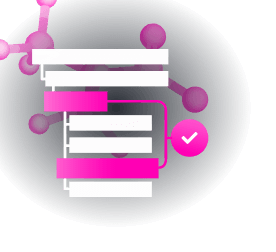Explore a selection of our essential drug information below, or:
Identification
- Generic Name
- Plozalizumab
- DrugBank Accession Number
- DB12520
- Background
Plozalizumab has been investigated for the treatment of Atherosclerosis. Plozalizumab, a novel humanized monoclonal antibody, specifically targets CCR2 chemokine receptors found on the surface of certain white blood cells including macrophages and monocytes. Preclinical studies suggest that CCR2 plays an important role in the trafficking of monocytes and macrophages to sites of inflammation. The recruitment of macrophages to the arterial wall is believed to be a critical step in the development of atherosclerosis.
- Type
- Biotech
- Groups
- Investigational
- Biologic Classification
- Protein Based Therapies
Monoclonal antibody (mAb) - Protein Chemical Formula
- Not Available
- Protein Average Weight
- Not Available
- Sequences
- Not Available
- Synonyms
- Plozalizumab
- External IDs
- MLN-1202
- MLN1202
Pharmacology
- Indication
Not Available
 Reduce drug development failure ratesBuild, train, & validate machine-learning modelswith evidence-based and structured datasets.Build, train, & validate predictive machine-learning models with structured datasets.
Reduce drug development failure ratesBuild, train, & validate machine-learning modelswith evidence-based and structured datasets.Build, train, & validate predictive machine-learning models with structured datasets.- Contraindications & Blackbox Warnings
 Prevent Adverse Drug Events TodayTap into our Clinical API for life-saving information on contraindications & blackbox warnings, population restrictions, harmful risks, & more.Avoid life-threatening adverse drug events with our Clinical API
Prevent Adverse Drug Events TodayTap into our Clinical API for life-saving information on contraindications & blackbox warnings, population restrictions, harmful risks, & more.Avoid life-threatening adverse drug events with our Clinical API- Pharmacodynamics
Not Available
- Mechanism of action
Preclinical studies suggest that CCR2 plays an important role in the trafficking of monocytes and macrophages to sites of inflammation. The recruitment of macrophages to the arterial wall is believed to be a critical step in the development of atherosclerosis. Plozalizumab targets CCR2 chemokine receptors found on the surface of certain white blood cells including macrophages and monocytes.
Target Actions Organism UC-C chemokine receptor type 2 Not Available Humans - Absorption
Not Available
- Volume of distribution
Not Available
- Protein binding
Not Available
- Metabolism
- Not Available
- Route of elimination
Not Available
- Half-life
Not Available
- Clearance
Not Available
- Adverse Effects
 Improve decision support & research outcomesWith structured adverse effects data, including: blackbox warnings, adverse reactions, warning & precautions, & incidence rates. View sample adverse effects data in our new Data Library!Improve decision support & research outcomes with our structured adverse effects data.
Improve decision support & research outcomesWith structured adverse effects data, including: blackbox warnings, adverse reactions, warning & precautions, & incidence rates. View sample adverse effects data in our new Data Library!Improve decision support & research outcomes with our structured adverse effects data.- Toxicity
Not Available
- Pathways
- Not Available
- Pharmacogenomic Effects/ADRs
- Not Available
Interactions
- Drug Interactions
- This information should not be interpreted without the help of a healthcare provider. If you believe you are experiencing an interaction, contact a healthcare provider immediately. The absence of an interaction does not necessarily mean no interactions exist.
Drug Interaction Integrate drug-drug
interactions in your softwareAbciximab The risk or severity of adverse effects can be increased when Abciximab is combined with Plozalizumab. Adalimumab The risk or severity of adverse effects can be increased when Adalimumab is combined with Plozalizumab. Aducanumab The risk or severity of adverse effects can be increased when Aducanumab is combined with Plozalizumab. Alemtuzumab The risk or severity of adverse effects can be increased when Alemtuzumab is combined with Plozalizumab. Alirocumab The risk or severity of adverse effects can be increased when Alirocumab is combined with Plozalizumab. - Food Interactions
- Not Available
Categories
- Drug Categories
- Chemical TaxonomyProvided by Classyfire
- Description
- Not Available
- Kingdom
- Organic Compounds
- Super Class
- Organic Acids
- Class
- Carboxylic Acids and Derivatives
- Sub Class
- Amino Acids, Peptides, and Analogues
- Direct Parent
- Peptides
- Alternative Parents
- Not Available
- Substituents
- Not Available
- Molecular Framework
- Not Available
- External Descriptors
- Not Available
- Affected organisms
- Not Available
Chemical Identifiers
- UNII
- 4XG66BMN0D
- CAS number
- 1610761-46-0
References
- General References
- Not Available
- External Links
- PubChem Substance
- 347911340
- Wikipedia
- Plozalizumab
Clinical Trials
- Clinical Trials
Clinical Trial & Rare Diseases Add-on Data Package
Explore 4,000+ rare diseases, orphan drugs & condition pairs, clinical trial why stopped data, & more. Preview package Phase Status Purpose Conditions Count Start Date Why Stopped 100+ additional columns Unlock 175K+ rows when you subscribe.View sample data2 Completed Treatment Atherosclerosis 1 somestatus stop reason just information to hide 2 Completed Treatment Metastatic Cancer / Unspecified Adult Solid Tumor, Protocol Specific 1 somestatus stop reason just information to hide 2 Completed Treatment Multiple Sclerosis 1 somestatus stop reason just information to hide 2 Withdrawn Treatment Atherosclerotic Cardiovascular Diseases 1 somestatus stop reason just information to hide 2 Withdrawn Treatment Diabetic Nephropathy 1 somestatus stop reason just information to hide
Pharmacoeconomics
- Manufacturers
- Not Available
- Packagers
- Not Available
- Dosage Forms
- Not Available
- Prices
- Not Available
- Patents
- Not Available
Properties
- State
- Not Available
- Experimental Properties
- Not Available
Targets

- Kind
- Protein
- Organism
- Humans
- Pharmacological action
- Unknown
- General Function
- Protein homodimerization activity
- Specific Function
- Receptor for the CCL2, CCL7 and CCL13 chemokines. Transduces a signal by increasing intracellular calcium ion levels. Alternative coreceptor with CD4 for HIV-1 infection.
- Gene Name
- CCR2
- Uniprot ID
- P41597
- Uniprot Name
- C-C chemokine receptor type 2
- Molecular Weight
- 41914.265 Da
Drug created at October 20, 2016 22:41 / Updated at February 21, 2021 18:53

